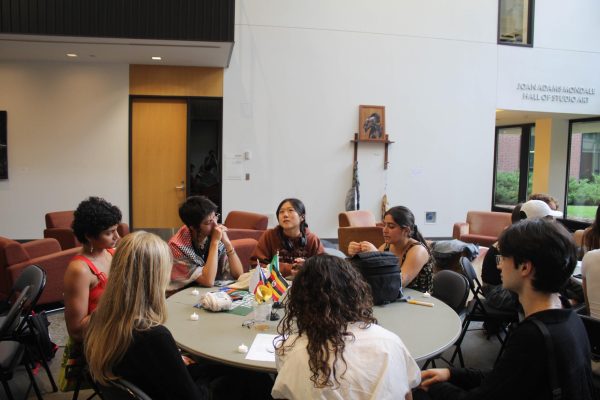Poverty and Policy in the US

February 25, 2021
Economics professor Charlotte Tuttle is currently teaching Poverty and Policy in the U.S., a class on how U.S. policy has attempted to address domestic poverty issues, with and without success. The class covers topics such as food security, healthcare and housing. Students learn about policy programs such as the Supplemental Nutrition Assistance Program (SNAP) and the Earned Income Tax Credit (EITC).
Tuttle said economics department chair Sarah West asked her to teach a class in place of Urban Poverty, taught by former Macalester professor Samantha Snyder Çakır. Tuttle researched food security and food stamps during her Ph.D. and has a background with the U.S. Department of Agriculture. After attending housing sessions at public policy conferences, she was inspired to create a class that covered a variety of different policy issues relating to poverty in the U.S.
“Maybe two years ago, pre-COVID, I went to a public policy conference and for the first time they were having all these different housing sessions,” Tuttle said. “Usually, I go to the food security or health sessions. But I was like, wow, this is actually pretty interesting.”
According to Tuttle, many of the professionals at the conference were talking about Mathew Desmond’s book “Evicted: Poverty and Profit in the American City.” Desmond is a professor of sociology at Princeton University and his book is one of the first that gives an in-depth account of the experience of housing instability.
“Originally, I said to Sarah, maybe I could just teach his book ‘Evicted,’” she said. “Housing is a big deal — we don’t talk about it as much. It is particularly important because not only does it hit [people of color] disproportionately, but also women of color.” “We don’t really like to talk about women of color and how policies affect that demographic,” she added.
Tuttle wanted to teach a broader variety of types of poverty alleviation policies, so that the class wouldn’t just focus on what she was most interested in.
“It would be cool to teach students about the [Affordable Care Act] and the rhetoric around Medicare for all, which I feel like people aren’t really grasping, and then do a couple of weeks on housing, look at COVID and what is happening with schools; do some stuff on education,” she said. “This way, these students can get a taste of all different kinds of policy related to poverty and poverty alleviation and it’s not just what I’m passionate about.”
Sarah Gotbetter ’22 is currently taking Tuttle’s class and said that learning more about how economic theory was used in practice by politicians and economists was particularly interesting.
“I am an economics major and a lot of courses I have taken for my major have focused on economic theory and I haven’t had a chance to explore how economists and politicians use economic theory in practice,” she wrote in an email to The Mac Weekly.
Peter Vitalis ’22, another student in the class, says that the class has shown him how ineffective, even destructive, poverty alleviation programs can be.
“I’ve taken away that sadly many of these policies that are meant to help people really don’t,” he wrote in an email to The Mac Weekly. “Many times they fall short and often create a cycle that doesn’t incentivize moving out of poverty. If many of these programs could be revamped and not held back more people would be helped. We are so afraid of spending money to help people.”
Gotbetter says one of the most important takeaways from the class has been the devastating effects poverty stigma can have on a person’s willingness to participate in poverty alleviation programs.
“My biggest takeaway thus far is the vast number of Americans who are eligible for programs to help alleviate poverty, yet do not to seek these benefits due to administrative barriers or stigma around seeking welfare assistance,” she wrote. “This has reinforced for me how important it is to de-stigmatize poverty and create a governmental system that assumes low income people just need some assistance and are not inherently lazy or people taking advantage of the welfare system.”
Tuttle hopes her class can show the power of economics in influencing policy and, ultimately, improving people’s lives.
“What I want students to be passionate about is how policy and economics can really address income inequality and poverty,” she said. “That’s why I went into economics.”
“For some reason I thought economists could save the world,” Tuttle added, laughing.












